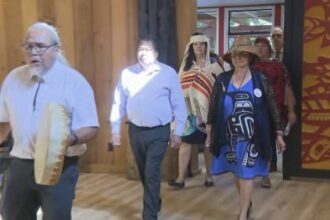In a contentious development that threatens to strain already fragile government-Indigenous relations, federal officials have informed First Nations chiefs they must submit their questions in advance of a pivotal meeting with key ministers on major infrastructure and resource development initiatives.
The directive came via email earlier this week ahead of the scheduled July 25 virtual roundtable with Finance Minister Michael Carney and Natural Resources Minister Jonathan Wilkinson. The meeting aims to address what Ottawa has branded as “responsible resource development” on traditional territories across Canada.
“This pre-screening of questions raises serious concerns about transparency and authentic dialogue,” said Chief Darcy Gray of the Listuguj Mi’gmaq Government in Quebec. “We’re not looking for a choreographed presentation but meaningful engagement on projects that directly impact our lands and communities.”
According to documents obtained by CO24 News, the federal email specified that chiefs must submit their questions at least 72 hours before the meeting, with no guarantee all inquiries would be addressed during the session. The correspondence also indicated the roundtable would be limited to two hours, a timeframe many Indigenous leaders consider inadequate given the complexity of the issues at stake.
The controversial approach comes as Canada faces mounting pressure to expedite approval processes for critical infrastructure projects, particularly those related to energy transition and mineral extraction. The Carney administration has repeatedly emphasized the economic importance of these initiatives while simultaneously pledging deeper consultation with Indigenous communities affected by development.
“There’s a fundamental disconnect between Ottawa’s public commitment to nation-to-nation relationships and these bureaucratic constraints on dialogue,” noted Professor Hayden King, Executive Director of the Yellowhead Institute at Toronto Metropolitan University. “Pre-submitting questions transforms consultation into a performance rather than a substantive exchange.”
Several First Nations leaders have expressed frustration that the format appears designed to limit spontaneous discussion and challenging questions. The Assembly of First Nations has formally requested reconsideration of the meeting parameters, citing inconsistency with the principles outlined in the United Nations Declaration on the Rights of Indigenous Peoples (UNDRIP), which Canada has incorporated into domestic law.
Government officials defended the approach, with a spokesperson for Minister Carney stating the pre-submission requirement would “ensure comprehensive and well-researched responses” and allow for “more productive use of the limited time available.” The spokesperson emphasized that additional follow-up sessions would be scheduled based on the outcomes of this initial meeting.
This development occurs against a backdrop of Canada’s ongoing legal obligations to consult Indigenous communities on resource projects. Recent Supreme Court rulings have reinforced the duty to consult and accommodate Indigenous concerns, creating a complex legal landscape for project approvals.
Industry stakeholders are watching closely, as delays in regulatory processes have previously led to project cancellations and investor uncertainty. The Business Council of Canada recently called for “clear, predictable consultation frameworks” that respect Indigenous rights while providing certainty for business planning.
As the meeting date approaches, the question remains: can meaningful consultation occur within such structured parameters, or does true reconciliation require a fundamental reimagining of how governments and Indigenous nations engage on questions of land and resources?










